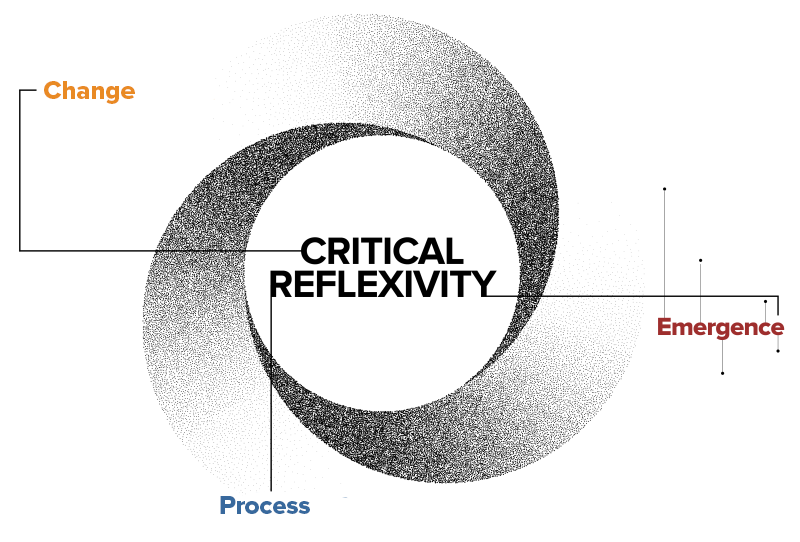
Mission
The Global Arts + Humanities Discovery Theme invests in cross-disciplinary collaborations that amplify the transformative power of the arts and humanities to respond to critical societal challenges to drive social change.
Impact cycle
If social change is viewed as a process and not simply a destination, then measures of impact must attend to these processes. To evaluate the social impact of cross-disciplinary collaborations, we must focus on context-dependent factors and processes in addition to outcomes. Standard metrics — like the number of publications, citations, performances, grants and awards — often do not account for the processes that enable such achievements — thus failing to capture the value of each stage of action and change. Moreover, by demystifying methods and valuation processes, we broaden the scope of what is impactful.
The Global Arts + Humanities Discovery Theme aims to broaden understanding of impact from the linearity of solutions-based frameworks to assessments that better align with collaborative research practices and the recursive and iterative nature of social change. The diagram above captures the recursive nature of collaborative research, the iterative nature of social change and the centrality of critical reflexivity to understanding impact.
Critical reflexivity
Critical reflexivity is indicative of a methodological orientation that moves beyond the exigent and instrumental. Critical reflexivity centers the relational and iterative; this orientation accounts for the movement between the emergence of issues and aspirations, the collaborative processes of research and creative action, and their outcomes that then provide the conditions for new materializations. Such reflexivity illuminates disciplinary assumptions and bias, power and stakeholder interests and variances in understanding of time and labor – embedding an ethical dimension into every stage of the cross-disciplinary research cycle.
In doing so, it fosters critical thinking; demystifies assumptions and diversifies knowledge; builds contextual understandings; embeds an ethical dimension into research cycles; and centers marginalized voices and experiences. Critical reflexivity is a key component of the impact cycle captured below by the following stages:
Emergence Critical societal challenges — multi-causal, multidimensional and resistant to singular solutions — push the boundaries of disciplinary understanding and call for cross-disciplinary collaborations and multifaceted solutions. Solutions to complex problems can only be transformative if they attend to these histories, material contexts and embodiments. The impact cycle diagram above propels a shift from crisis-based thinking to contextual thinking and captures the dynamic nature of critical societal challenges, including their emergence in relation to material histories and contexts and the process of them coming into view. The emergent inspires new and more equitable solutions, animating researchers and creative practitioners as change agents.
Process As a cross-disciplinary initiative, GAHDT recognizes that social change involves understanding the differential impacts of institutional systems and policies on communities, as well as the interconnections and interdependencies within and across systems and communities. Integrated arts and humanities methods and practices forefront deep observation, listening, empathy and skills to communicate diverse viewpoints and imaginative possibilities. These methods provide indispensable tools for understanding these complex relations, which are vital to civic engagement, social belonging and democratic processes. They stimulate creativity, consensus building and conflict resolution — enabling qualitative collaborations that rely on the ethics of reciprocity and mutuality.
Change Sustainable social change relies on knowledge production and praxis-based interventions that raise awareness, shift behaviors and attitudes and shape aspirations and civic motivations. Such transformations enable innovation as well as adaption to ever changing contexts and realities. They help advance access and opportunity and foster social belonging and democratic outlooks. These forms of learning and engagement impact policy actions and strategic decision making — ultimately restructuring the wider social, economic and political context to create a more just, inclusive and civil society.
